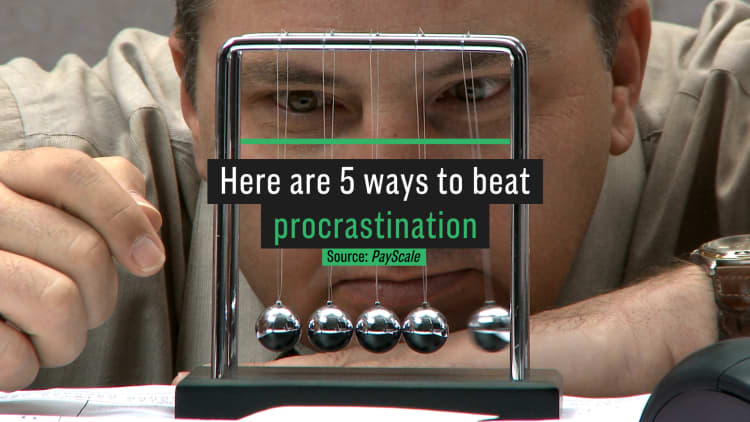Changing your bad procrastination habits is easier than you might realize, according to clinical psychologist and procrastination coach Christine Li. "People would be surprised to know that procrastination often comes from a lack of belief in themselves."
In an interview with CNBC Make It, Li shares a five-part strategy she developed to help anyone cope with the practical and mental hurdles procrastinators face. Applying the five principles of her "SMACK" solution throughout the day can help procrastinators take control of their schedules and build empowering habits.
1. Simplicity: Streamline your life
Li suggests you consider your most essential tasks and how you can make them easier to complete. This might mean eliminating hurdles in your day such as overlapping appointments in your schedule, a complicated commute or reducing the amount of time you spend on email.
It might even mean clearing out clutter from your purse or closet to make it easier to get going during the day. Simplifying your life will lighten the load on your brain, says Li, and help get rid of anxious thoughts. According to Li, it's an immediate win.
2. Mindfulness: Stay in the moment
Procrastinators don't view time like other people, according to Li. They tend to focus on the past (regretting their mistakes) or the future (being anxious about what they are struggling to make happen). As a result, they can easily become overwhelmed by past mistakes and looming deadlines, missing out on good feedback and learning opportunities in the moment.
Instead, Li suggests you be mindful, thinking just about the present, accepting each moment as it comes for what it is. When you think about what you need to do in the present moment, you stand a better chance to cope and make effective decisions that will move you forward.
3. Anxiety: Reduce your worry
Anxiety, while natural, is just a transient feeling, says Li. It exists to warn us in critical moments when danger is near. However, by worrying unnecessarily, we risk abusing that natural system and depleting our energy resources.
To help overcome anxiety, Li suggests you pretend to be your own lawyer, coming up with an argument for why you shouldn't feel anxious. Find a way to think differently about that moment, she says. Remind yourself: the world is not going to fall apart, the sun is rising, and people around you all seem calm.
4. Communication: Find your voice
Procrastinators tend to withdraw and go silent when they become anxious. As a result, they cut themselves off from communication and strategies that can help them find support and solutions. When you feel overwhelmed, remind yourself to clearly, openly and honestly communicate your concerns. Honest communication, says Li, is underrated as a wellness method.
5. Kindness to self: Remember to smile
Procrastinators often self-criticize, says Li, but negative self-talk will hold you back. In moments when you want to berate yourself for poor planning or how you've handled your time, be kind instead. Be patient with yourself as you make new changes, reminding yourself you are a work in progress. She even suggests you take the opportunity to indulge in the humor in the situation you created for yourself and find a reason to smile.
"Really, we have no limits except those that we impose on ourselves," she adds. "The negative thoughts will always be there, but we need to know that we can quickly return to the positive view of things."
Like this story? Subscribe to CNBC Make It on YouTube!
Don't miss:


